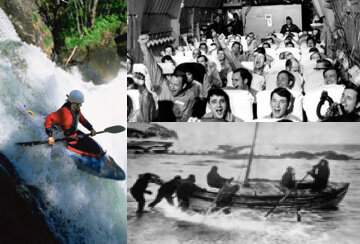
As prisoner of war, fighter pilot Charlie Plumb lived in an 8×8-foot cell for five years, after being shot down during the Vietnam War. (POWs pictured here on flight departing Hanoi.)
Polar explorer Ernest Shackleton’s ship Endurance sunk when it was crushed in the Antarctic ice pack.To save his crew of 28, he led them on an epic journey more than 1,000 miles to safety.
Adventure racer Robyn Benincasa had to stop competing in grueling 300-mile races when she was diagnosed with end stage osteoarthritis in both hips.
You’re probably feeling pretty challenged these days by the uncertainty, fear and financial troubles brought on by the COVID-19 crisis and the rapidly unfolding recession. It will take years for many businesses to recover and, frankly, many never will. Sometimes it looks like an impossible task. But we can learn valuable lessons from others who have overcome unimaginable obstacles and, in the process, turned disaster into triumph.
Vietnam war POWs, a legendary Antarctic explorer, and an adventure racer provide four consistent principles than can inspire you in leading your organization during this time of great uncertainty.
1. Keep re-focusing on your purpose
In 1914, Ernst Shackleton set out to lead a polar expedition across the Antarctic ice cap. But when his ship Endurance was trapped in the ice pack and finally sunk, the commander’s purpose changed overnight from exploration to survival. Shackleton’s sole purpose became getting his entire crew safely across an unstable ice pack and 800 miles of open ocean.
Purpose is always important and, in good times and bad, leaders should be continually focusing on the purpose or mission of their business. Your original purpose, however, may no longer seem relevant in this COVID-19 recession. But great leaders find ways to adapt or even redirect their reason for being.
In 1967, Navy fighter pilot Charlie Plumb’s mission went from actively fighting a war to surviving honorably as a prisoner of war in a tiny cell. And Robyn Benincasa, after years of brutal adventure racing, was told her racing career was over when she was diagnosed with end stage osteoarthritis in both hips. So Benincasa had to find another purpose in the challenges she set for herself.
Your business may be able to survive and continue to serve customers in the COVID-19 recession. If so, your task is recommitting to your company’s purpose. This will be critical to keep employees motivated in difficult, cost-constrained times.
But if your business is hugely disrupted, or even wiped out, you’ve got to adapt your purpose. There is no shame in that. Shackleton, Plumb and Benincasa all experienced major crises in their lives that forced them to reinvent their purpose – to survive and make a difference in the lives of others.
What’s your purpose going forward?
2. Reframe adversity – Crises won’t break you. How you think about them will.
As a POW, Plumb learned that being confined for over five years in that 8×8-foot cell was not his greatest challenge. It was managing what went on in the 8 inches between his ears. That was the biggest test, he says. Overcoming great adversity occurs only when we learn how to think differently about the challenges we face.
Benincasa likes to remind her audiences “Pain is inevitable. Suffering is optional.” It is brought on by how we think about and frame the pain. During one 300-mile race, Benincasa was dehydrated, struggling tremendously and broke down crying, thinking she couldn’t go on. That was when a teammate gently grabbed her arm and got her moving again, saying, “People who win the Eco Challenge are crying and walking at same time.”
Despite years of torture and only thin soup for food, more than 500 ex-POWs emerged from their captivity healthier than if they had not been shot down. According to Plumb, 30% of Vietnam veterans were diagnosed with PTSD. But only 4% of POWs were diagnosed as suffering from these mental health issues. Adversity doesn’t break you. It’s how you think about it and use it to grow that can determine the impact on your life and business.
Can you think differently about your current situation or the uncertainty you face?
3. It’s your comebacks that people remember – not your setbacks.
No one remembers Ernst Shackleton as the polar explorer who failed to achieve his goals on multiple expeditions to the Antarctic. Instead, he is counted as one of the greatest leaders of all time for his comeback – rescuing his entire crew in a heroic journey out of that frozen land after losing his ship.
U.S. fighter pilots who became POWs in North Vietnam haven’t been judged for losing their planes in combat and ending up in enemy hands. These men are defined by how they persevered so bravely in captivity and emerged to lead incredibly productive, rewarding lives after the war.
Robyn Benincasa had to quit adventure racing because of stage four osteoarthritis in her hips. Initially, she says she was “completely crushed.” But soon she realized that the key was what she did next. Her life changing physical setback led her to create the Project Athena Foundation. This non-profit helps women who’ve experienced medical and traumatic setbacks transition from survivor to athlete through challenging physical adventures. “This is the best thing that’s ever happened in my life,” says Benincasa.
What’s your comeback going to be coming out of the COVID-19 recession? You may not know yet, but focus on what’s ahead of you, not what’s happened.
4. Your teammates are everything! Collaborate with great people who share a related goal.
Shackleton insisted on hiring optimists for his crew, who also shared his vision for what the expedition was trying to accomplish. Given the unbelievable hardships this group faced after their ship sunk, the upbeat personalities of Shackleton’s crew and their loyalty to him was essential in their survival.
POWs at what was dubbed the “Hanoi Hilton” didn’t get to select their teammates. But leaders in the group worked assiduously to create and reinforce a “we culture.” They knew their power as a group was much greater than as individuals. Unlike POW camps in previous wars, which usually produced “every man for himself” experiences, the US pilots captured by the Vietnamese became a high performing team. Their willingness to sacrifice for each other, often accepting torture for another man’s actions, created an intense sense of commitment to a shared mission they called, “Return with honor.”
In uncertain high-stress environments, the ability of teammates to adapt effectively to changing circumstances can be their most valuable trait. Benincasa tells the story of a French adventure race team who lost a teammate to a broken ankle on the way to the starting line in a remote Borneo location.
To compete, the French team frantically drafted a 35-year-old farmer in the region as their fourth teammate. This guy had never raced and had to learn how to ride a bicycle on the fly during the five day race. Not only did the team complete the grueling course, they finished second! “Often what makes us valuable to our team members is not what we know but what we’re willing to learn along the way,” says Benincasa.
Are you surrounding yourself with teammates who are optimistic, committed to your mission, and always willing to learn?
You may be feeling overwhelmed by the health and financial challenges you’re facing. But, as bad as things seem, others have faced much worse threats – and thrived. And their lessons that can inspire and teach us how to come through this crisis better than we ever dreamed.
Contact me if you’d like to set up a free consultation to explore how I can help you find solutions for the critical workforce challenges your business is facing in this new recession.
